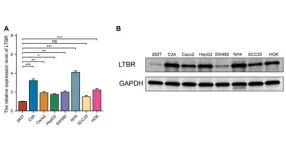(Press-News.org) Everyone ruminates about the bad things that happen to them. Whether it’s a nasty breakup, an embarrassing failure or simply when someone is mean, it can be hard to stop thinking about what happened and why. For people who ruminate too much, this negative thought pattern can cause lasting problems with mental health.
A research team led from the University of California, Davis, Center for Mind and Brain found that adolescent girls who have a stronger tendency to ruminate show different patterns of brain activity when faced with social rejection. The study was published in December in the journal Developmental Cognitive Neuroscience.
“Everyone experiences rejection, but not everyone experiences it in the same way,” said Amanda Guyer, associate director of the Center for Mind and Brain and professor of human ecology at UC Davis. “By identifying what brain processes cause differences in the tendency to ruminate, we can provide people better ways to avoid long-term harm.”
Experiencing rejection during a brain scan
The immediate experience of social rejection leaves distinct fingerprints on the brain that can be measured by functional magnetic resonance imaging, or fMRI. This type of scanning can spot minute changes in blood flow and electrical activity in different parts of the brain. The wide range of what one feels and thinks is visible on an fMRI scan in real time.
In this study, 116 girls ranging in age from 16 to 19 took part in two tasks to measure how their brains responded to social rejection. During the first visit, the participants were shown photos of 60 teens their age and asked to select 30 they would want to chat with.
For the second visit, the participants were placed in the fMRI scanner and told which of the teens in the photos wanted to chat with them — and which teens didn’t. While in the fMRI scanner, the girls were also asked how these responses — and how being rejected by someone they chose during the first visit — made them feel. The data was collected from 2012 to 2014 and analyzed in 2023 when researchers applied new test methods.
How negative emotions can encode a self-image
The fMRI showed that rejection increased activity in the parts of the brain that are known to play a role in how we define who we are.
These parts of the brain are all active with increased blood flow and electrical activity when we think about ourselves, or our emotional states, and when we retrieve our memories.
Being told a peer didn’t want to chat with them was a form of social rejection, and this rejection showed up in the brain scans to varying degrees for every girl. However, girls who self-reported a tendency to ruminate had the highest activity in their brain scans.
“Our results suggest that girls who tend to ruminate are experiencing more than just momentary sadness after rejection,” said Guyer. “They are deeply internalizing this negative feedback into their self-concept.”
Changing the story to stop rumination
These findings show that unique processes in the brain are at play after rejection for girls with a high tendency to ruminate. This knowledge makes it possible to target interventions that can treat rumination so it doesn’t cause bigger problems later on, Guyer said.
“Our study suggests that it can make a difference to reframe their negative experiences in a way that makes them feel better afterward instead of worse,” said Guyer.
Besides Guyer, additional authors include Leehyun Yoon, also of UC Davis; Kate Keenan, University of Chicago, and Alison E. Hipwell and Erika E. Forbes, both of University of Pittsburgh.
The study was funded by grants from the National Institutes of Health.
END
Neurons intricately communicate and respond to stimuli within a vast network, orchestrating essential functions from basic bodily processes to complex thoughts. Traditional neuroscience methods, relying on in vivo electrophysiology (within a living organism), often have difficulty addressing the complexity of the brain as a whole. An alternative approach involves extracting cells from the organism and conducting studies on a culture dish instead (in vitro), providing researchers with enhanced control and precision in measuring neural processes. In a new study featured in Advanced Science, researchers unveil a cost-effective, open-source in vitro system ...
While recent therapies have the potential to stall or delay the progression of multiple sclerosis, a new study shows that young Black and Hispanic women fare worse than young white women.
Minority women were more likely to have more advanced disease and faced greater challenges in pregnancy, the researchers reported in their study, publishing in the journal Neurology on Jan. 23, 2024.
Researchers tracked medical records at nine MS centers throughout the country for 294 women whose pregnancies resulted in live births. Approximately half of the patients ...
Combining testosterone-blocking drugs in patients with prostate cancer relapse prevents the spread of cancer better than treatment with a single drug, a multi-institution, Phase 3 clinical trial led by UC San Francisco researchers has found.
The approach can extend the time between debilitating drug treatments without prolonging the time it takes to recover from each treatment.
Prostate cancer affects 1 in 8 men and causes 34,000 deaths each year in the United States. It is usually treated with one of several testosterone-lowering drugs for a set period of ...
MEDIA CONTACT:
Cate Douglass; cdouglass@gwu.edu
More than 50 countries are set to hold national elections this year and analysts have long sounded the alarm on the threat of bad actors using artificial intelligence (AI) to disseminate and amplify disinformation during the election season across the globe.
Now, a new study led by researchers at the George Washington University predicts that daily, bad-actor AI activity is going to escalate by mid-2024, increasing the threat that it could affect election results. The research, published today in the journal PNAS Nexus, is the first quantitative scientific ...
First study to examine the impact of tissue contamination on AI models
‘If it’s paying attention to the tissue contaminants, it’s paying less attention to the patient’s tissue that is being examined’
‘Pathologists fear — and AI companies hope — that the computers are coming for our jobs. Not yet.’
Human pathologists are extensively trained to detect when tissue samples from one patient mistakenly end up on another patient’s microscope slides ...
“[...] we identified LTBR as a potential target for cancer immunotherapy and a marker of immune infiltration and poor prognosis.”
A new research paper was published in Aging (listed by MEDLINE/PubMed as "Aging (Albany NY)" and "Aging-US" by Web of Science) Volume 16, Issue 1, entitled, “Systematic analysis of the prognostic value and immunological function of LTBR in human cancer.”
Lymphotoxin beta receptor (LTBR) is a positive T cell proliferation regulator gene. It is closely associated with the tumor immune microenvironment. However, its role in cancer and ...
The CUNY Graduate School of Public Health and Health Policy (CUNY SPH) has announced an expansion and endowment of the Molina Health Equity Scholarship Fund as a groundbreaking and permanent source of support for students dedicated to advancing health equity in underserved Hispanic and Latino communities.
Established by Dr. Marilyn Aguirre-Molina, CUNY SPH professor emerita and CUNY SPH Foundation Board member, and distinguished academician Dr. Carlos W. Molina, the Molina Health Equity Scholarship Fund now becomes the first named and endowed master’s degree scholarship in the school’s ...
A recent study from researchers at University Hospitals (UH) Connor Whole Health examined variables associated with engagement in (1) integrative health and medicine (IHM) and (2) nonpharmacologic modalities rather than opioids among United States adults with chronic pain. The study, published in the Journal of Pain Research, uncovered disparities in access to these modalities, particularly among older adults, Black/African American individuals, and those with higher depressive symptoms and lower education and income levels, who are more likely to have chronic pain.
The researchers used data ...
CHAMPAIGN, Ill. — More than 25% of the young adults surveyed in a recent study mistakenly believed that sexual activity increases older adults’ risk of heart attack and that disinterest in sex is a normal and inevitable part of aging. While most of those in the study had permissive views about sexual activity in later life, the findings also shed light on the misconceptions and ageist views that can infringe on older adults’ rights to sexual expression.
More than 270 young adults ages 18-35 participated in the study, which assessed their level of knowledge about sexuality in older adulthood, their general attitudes toward ...
Marine heat waves appear to trigger earlier reproduction, high mortality in early life stages and fewer surviving juvenile Pacific cod in the Gulf of Alaska, a new study shows. These changes in the hatch cycle and early growth patterns persisted in years following the marine heat waves, which could have implications for the future of Gulf of Alaska Pacific cod, an economically and culturally significant species,
END ...




